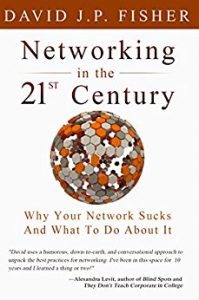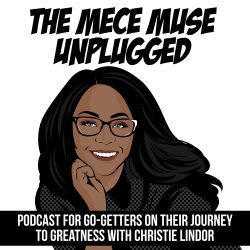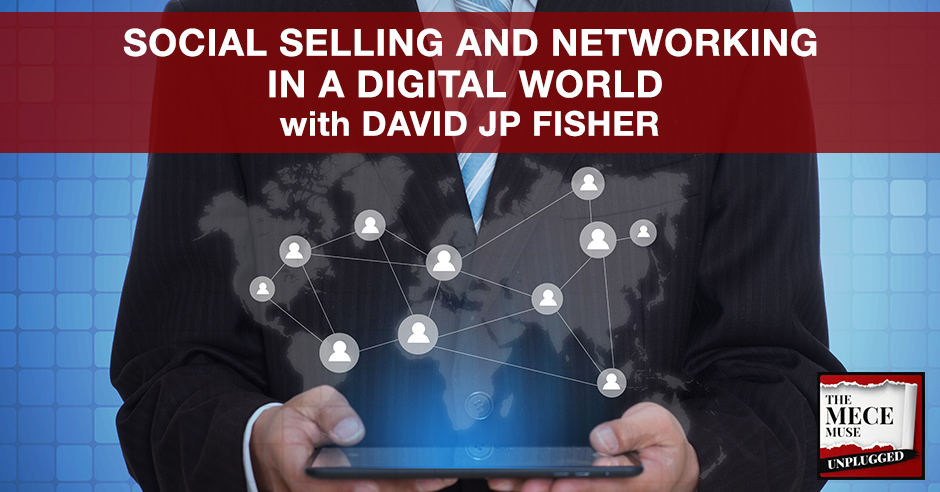We’re going to be doing a Quick Wins interview. Quick Wins is when I have the opportunity to connect with individuals discussing products, ideas or services to help round out your consulting toolkit. Our guest is David JP Fisher. He is a consultant, a business coach, and an author. He’s got a great book called Hyper-Connected Selling and we go deep about social selling and networking in a digital world. David provides a lot of key insights of his experiences as a consultant, the importance of networking, why networking is the key to unlocking a lot of doors to professional success. David brings down-to-earth tactical ways that you can begin to elevate your social selling game today in a way that’s manageable, that’s realistic. David provides some resources and more insights on his website.
I wanted to share an announcement. I’m thrilled to now be able to announce that I’m going to be doing my first TEDx Talk. I’m excited about that and I’m a confirmed speaker for TEDx Zaragoza in Spain. I’m going to be talking about the topic of organizational cultures. I wrote a blog post and it went viral on my blog. It’s funny because when I look at the other blog posts on my website, it got under 100 hits or so. This one post has over 100,000 hits. It was pretty remarkable. I wrote about organizational cultures. The blog post went viral and here I am, I’m doing a TEDx Talk on it. I’m super thrilled to be sharing this news with you Go-Getters.
Listen to the podcast here:
Podcast: Play in new window | Download | Embed
Subscribe: Apple Podcasts | Email | TuneIn | RSS | More
David, welcome to the MECE Muse Unplugged. How are you doing?
I am living the dream. Excited to be here.
What part of the world are you in right now, David?
I am in my home base in Chicago, Illinois.
Thank you again for being on the show. Before we get started, if you can introduce yourself to the Go-Getters of the MECE Muse Unplugged.
My name is David JP Fisher, but pretty much everybody calls me D Fish, which is a nickname I picked up when I was playing in a band in an earlier incarnation of my life. For the last almost thirteen years, I’ve run a consulting firm called RockStar Consulting where I’ve been a professional business coach and sales trainer. Over the last few years, I’ve written a number of books including Networking In The 21st Century: Why Your Network Sucks And What To Do About It. We released Hyper-Connected Selling.

I got my start in the sales and entrepreneurship world coming right out of college. I ran a sales company here in Chicago for a company called Cutco, which many people are familiar with. We sold kitchen knives and took the experiences that I developed there and continued on through my career in sales and entrepreneurship. Today, I coach professionals. I do a lot of speaking and training around the country in the world, which is a lot of fun. I write books, which is also a lot of fun.
David, you have an impressive background. I was looking at the number of books you’ve written. I definitely want to talk to you about your book, Hyper-Connected Selling. It’s got some great insights. Maybe you can tell us how did you get started in your career and what are you doing today?
Like many entrepreneurs, I am an accidental entrepreneur. I didn’t go to college going, “I want to run a professional development firm.” I was running an office here in my early twenties for Cutco Cutlery, interviewing and training sales reps, which was exciting. I had an opportunity to interview over 10,000 people in my time there, a baptism by fire for sure, but then went into sales management for the corporate side of things. Worked for Brink’s Security, was one of their sales managers here in the Chicago area. Did that for a year and realized that it’s a great company but I’m definitely an independent person. That’s why when I left there I was like, “What do I really like to do?” One of the things that stood out was I like to sell people on themselves.
I like to sell people on their opportunities. I found that there was a need for people who could be coaches but not in that, “I believe in you,” type of format but combining some of that positive thinking but also the straight, what you might call business consulting. Looking at how to dive into profit and loss statements, sales processes, marketing processes, and operations and that’s where I got my start working with small business owners, entrepreneurs. I work with a lot of solopreneurs. In 2008, there was a little bit of an economic hiccup and all of a sudden, there’s a lot of people who were out on their own. It was helping those people understand how to build a business but also balance that with living a good life and all the things that came along with that. That’s how I fell into this career path, but it’s been pretty awesome.
Given the breadth of people that you’ve connected with or come across in your journey, what would you say is a surprising a-ha moment you’ve had over the course of your career?
The biggest a-ha moment that I’ve had that’s affected me personally, but I’ve seen it with a lot of my clients, whether as a solopreneur or a large organization, is that we overcomplicate much of our lives, personally and professionally. We often think that there’s this magic pill that we don’t have access to, that once we get it, we’re going to be successful. After talking to many successful people, I realized that there is no secret to success. There are no tricks to the trade that you have to learn. You just have to learn the trade and you show up every day and you put the work in. It’s not always glamorous. It’s not always exciting. It’s not always sexy. The people that do the basics, the foundational work, day in and day out, are the ones that are successful long-term. It was an eye-opening thing as I saw that in my own personal journey as a professional, but also as something that I’ve now seen and hope to share with many of the clients that I work with, too.
I have the same philosophy about doing basic stuff remarkably well, as one key driver.
There are no secrets to success. Just keep working.
I want to pivot and talk a little bit about networking and social selling. Maybe for the Go-Getters, it’d be great for them to hear your definition of networking and also what is social selling? I hear it from time to time. How do you work both the networking and social selling to come together? How do you do that?
Let’s start with networking because that is a foundational part of professional success in today’s world. Most people have a complete misconception about what networking is. I do have my definition, my dictionary definition that I use in my books. Networking is building a web of relationships with others for mutual support and finding business solutions. That’s my boring technical answer. What networking is all about is it’s about building relationships with other people. Not only to find opportunities for ourselves but also to help those around us be successful. Networking has always been a key way that we, as humans, have created success. It’s how we find our spouses, our significant others. It’s how we often find our first jobs. It’s how we decide where to go to school and how you find the new bands that we like.
What we’ve seen over the last 100 years is the importance of doing this relationship building and going to our networks purposefully and intentionally in a way that we can find the solutions to the business challenges we have. Whether that’s finding a new job, whether that’s finding a new client, whatever it might be, but also helping to make sure everybody is successful. One of the things that I have seen, it’s what we talked about in the first book, Networking In The 21st Century, is that human beings aren’t inherently designed for networking or our brains are designed to know a few people, not hundreds and hundreds of people. There’s some science that shows the advantages of networks do come into play when they are bigger, so there’s this tension. Social media, for the mixed bag that it is, there’s good and bad to it. One of the things that it’s good at is helping us develop these light touches with a broader spectrum of people. It allows us to engage with a broader network than we would normally be able to.
That’s where idea of social selling comes in. Social selling was this idea of using social media, LinkedIn, Facebook, Twitter, even texting and stuff like that. It was the idea of bringing that into the sales process. When social media was brand new, that was risqué and crazy. You can’t sell anything just because you tweeted somebody. What it’s evolved to is the idea of integrating social platforms, digital platforms into the relationship building that we do on a professional basis. I don’t think it’s about just using LinkedIn to do all of your business relationships. It’s melding them together. It’s meeting somebody at a conference and then following up with them and connecting on LinkedIn and then you see each other a little bit. When you connect on Twitter and you see that they’re a fan of Star Wars, you’re like, “I’m a Star Wars fan, too,” and then you have this engagement back and forth. You go back offline, you run into another conference and that relationship is so much stronger because of the online engagement. That’s where I see not only networking but social selling, social media, sales and career development. They’re all wrapped up together. It is a holistic system. That’s how I define and look at those ideas.

You mentioned social selling as a holistic component of networking. Given your experience in the space, what are some common mistakes that individuals may make when they’re building their network or when their social selling? How can they overcome them?
Here’s a place I start with everybody is to let them know that networking is something that is worth your time. It is a valuable use of your time. It shouldn’t be an additive thing that you think of every once in a while. I like to call networking a lifestyle choice. One of the biggest mistakes people make with their careers, and this goes if you’re in a large organization looking to move up, if you’re looking to be independent and find new clients, most people only think about networking and relationships when they need something, when they’re desperate. The problem is others can smell desperation a mile away. It’s that person who we meet the first time and they’re already asking us for something. The biggest thing I could tell people is if you are in a place where you don’t need something from your network, from your relationships, you’re not looking for a promotion. You’re not looking for a new job. You’re not looking for a client, a partner or a vendor.
That is the time where you should invest in others. If you don’t need something, give. Find ways that you connect and help other people out. That’s the first thing is it’s not something to think about when you want help, but it should be part of what you’re doing on a regular basis. The next biggest tactical error I see people make, especially when we look at that idea of social media for social selling. We forget that there is this aspect of ourselves that is available 24 seven to anybody who wants to Google us. We have who we are as a person, but then we have this digital presence. We have this brand that is always available and often precedes us.
A story that I mentioned in the book, Hyper-Connected Selling, is the story of how I met my wife. We met in a very traditional offline setting. We were salsa dancing. I got her number. We were texting back and forth. We went on a first date, it was great. It was the third date that she then goes, “I Googled you. I found your blog.” I was like, “Hopefully, she’ll keep going out with me.” My blog was professionally based. I have a pretty significant footprint online because I do a lot of work there. I felt comfortable about that. We have to understand that all of us have that presence. We have a LinkedIn profile, we have Facebook activity that follows, tweets, the time we were interviewed for the college newspaper back when we were in college or whatever it might be, or we did a blog for our consulting firm. We have to remember that that is a huge part of how people are going to be influenced when they engage with us.
It makes sense to spend some time making sure that you present yourself in the best light. You can’t control what other people think of you, but you can control the information that’s out there that they’re going to use where they decide how they feel about you. That, more than anything else, is an important step to take up. Most people can take right away today, tomorrow. Google yourself, spend some time on your LinkedIn profile, whatever it is. Make sure that you’re putting the foot forward that you want to put. Those are two things.
Another thing that comes to mind as a misconception. I see with some of my mentees is the fact that they think of networking as working out. It’s this thing, you know you’ve got to do it, it’s good for you, but it’s this big ocean type of activity. In your book, Hyper-Connected Selling, you’ve got a quote that I love. The quote is, “If you have built a relationship with at least one other person up to this point in your life, you already have the foundation for success.” I love that because it crystallizes the fact that it’s not this big activity you’ve got to put time aside and do. Maybe you could elaborate on that thought and share some other insights.
One of the biggest challenges that people run to is exactly what you’re talking about. This idea that networking is this separate activity that we have to engage in, that we have put effort and work into. The reality is all of us are already in a network. We’re in a web of relationships. Unless you live under a rock, unless you’re a hermit, you’re in a cave and you don’t talk to anybody, you’re already within this network. All that separates people who are successful is that they’re intentional about it. They do put in some of those basic foundational activities and whether that’s going to some networking of bands or reaching out to people, having some conversations. I tell people this all the time. I go to very few “networking events” anymore. I’ve been doing this for a while. When I first got started out, I didn’t know a lot of people. Sure, I went to those events.
Now, my favorite thing to do is grab cups of coffee with people or a quick phone call. “How are you doing?” I like the chance to get to know people a little deeper. That works well for me and for my personality. There’s not one way of building a relationship that works. Understand you already have the human to human skills. We all do. That doesn’t mean that we don’t have some opportunities to improve because we all do. Whether that’s listening a little bit better or talking a little bit less, whatever it might be. Don’t make it seem like a mountain that has to be scaled. It’s about being a little more deliberate, a little more intentional with your current relationship building and having a lot of fun. A lot of my “networking”, my wife to this day laughs because I’m like, “I’m going to go network,” and she’s like, “No, you’re going to go hang out with your friend Jim.” I’m like, “No, we’re going to hang out and I liked him, but we all saw business too, so it works.” It’s a much more fun way of going through life.
A lot of people are probably looking at doing some resolution that I’m sure networking is probably on the top of that list for the ambitious Go-Getters out there. If the audience is hearing you and they’re like, “This is great. I definitely want to start to take my network to the next level. I want to get into some social selling,” what’s the one small thing that they can start to do right now to begin that process?
I’m going to do two things. Number one, I mentioned the LinkedIn profile before. That is the home base for your online presence. If I Google your name and your company or your name and your city, your LinkedIn profile will come up in the top three. Don’t look at it as a resume. Look at the LinkedIn profile as your personal professional website. Think about using it not as a resume, but as a place to tell your career story. Look at it from that lens and go, “Am I telling the story that I want?” and if not, spend the hour or two and make it look good. The other thing I’ll say is figure out one activity that you’re comfortable with that you could do on a weekly basis and make yourself do that. Whether it’s going to one networking event, whether it’s reaching out to one potential partner, client or something that you’d like in your network. Whether it’s writing somebody an email, whether it’s adding people to an online network that you’re in, like LinkedIn or Twitter. Just have one activity that you do every week because I tell people this all the time. If you have a cup of coffee with one person a week in a year, you’ve made 52 new connections. That’s going to blow your network out of the waters, it would be fantastic. Those are my two tips.
Maybe you can share with us a little bit about that book. We would love for you to give a little bit more about the book and how people can reach out to you.
Hyper-Connected Selling is a book that’s looking at everything we’ve been talking about. How does the combination of the digital world and the offline world, how can we navigate that to build better relationships and find business success? One of the things that has changed is because we are in an age of information overload. The way that we influence people has to change the value that we bring. Selling is in the title, but the reality is no matter whether or not, selling or sales is in your “job title”, we’re all salespeople. Whether it’s getting new clients for our own business or firm that we work for, whether it’s selling our ideas internally, we’re all selling. One of the things I think is so important is that we look at the idea of influence long-term.
We look at how we build relationships, how we establish trust and expertise early on. Instead of trying to convince people by having a clever trick to get them to agree with us, it’s about establishing trust. When we have that trust, using the expertise and knowledge that we have to help the people in our world make better decisions about the challenges that they’re facing and the possible solutions to them. When you think about what consulting is, that’s exactly what it is. It’s selling people on solutions to their challenges. That’s what I’m talking about in Hyper-Connected Selling. We look at it strategically. It’s also got a lot of great tactical ideas as well. Of course, I am biased. You can find all of my books on Amazon. It’s a little website most of your listeners have probably heard of it. There’s also a landing page specifically for all of you Go-Getters, it’s DavidJPFisher.com/Podcast/MECEMuse.
That has access to a lot of my material including a chance to download something that I’ve put together. It’s a report that I call 19 Ways To Improve Your Network Immediately. I gave you two tips today, it’s got seventeen more. I would definitely go check that out as well. You can always connect with me on Twitter, DFishRockStar, I’m on that a lot. I mentioned LinkedIn, LinkedIn.com/in/IAmDFish.
David, this was an absolute pleasure having you on the show. I would love to have you come back. You’ve took up so much experience and you’ve got a lot of different books. I would love to have you join us back on the show if you’d come back.
Name the day and time and I’m there.
Thank you, David. Thank you my Go-Getters for tuning in. Here’s to your journey to greatness.
Links from today’s episode:
- David JP Fisher
- Hyper-Connected Selling
- organizational cultures – blog post
- TEDx Zaragoza
- RockStar Consulting
- Networking In The 21st Century: Why Your Network Sucks And What To Do About It
- Cutco
- Brink’s Security
- DavidJPFisher.com/Podcast/MECEMuse
- DFishRockStar – Twitter
- LinkedIn.com/in/IAmDFish – LinkedIn
About David JP Fisher

David J.P. Fisher (D. Fish) is a sales expert, professional keynote speaker, and best-selling author. Building on over 20 years of experience as an entrepreneur and sales professional, he combines nuanced strategy and real-world tactics to guide individuals and organizations as they navigate and leverage the evolving landscape of sales.
He focuses particularly on the area where social selling, relationship-building, and old-school sales skills converge. He works to help create sustainable business growth by creating robust relationships with their clients and prospects that lead to more leads, easier conversations, and faster sales cycles.


